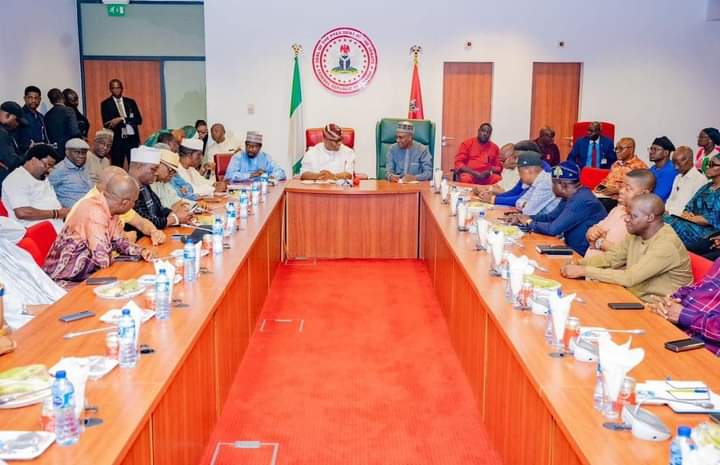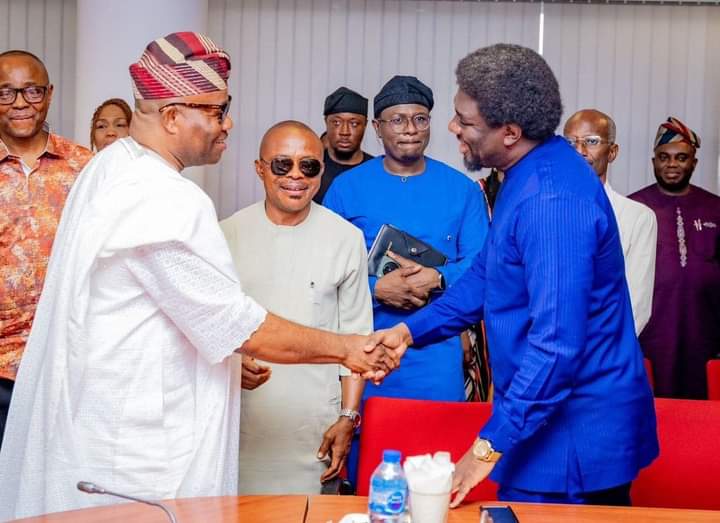Details have emerged from the mediation meeting held between the National Assembly caucus and leaders of the organised labour on Sunday night, aimed at averting the nationwide strike action proposed to start on Monday, June 3.
The President of the Senate, Godswill Akpabio, Speaker of the House of Representatives, Rt. Hon. Tajudeen Abbas, and other principal officers of the National Assembly held a closed-door meeting with representatives of the Nigeria Labour Congress (NLC), Trade Union Congress (TUC), and their affiliates.

The meeting, which took place on the 3rd floor of the Senate building and lasted into the night, also included Senator George Akume, Secretary to the Government of the Federation, SGF, Mr. Wale Edun, Minister of Finance, and other top government officials.
According to multiple reports, the mediation ended in a deadlock, and the strike action began across the country on Monday. However, the Spokesman of the Senate, Yemi Adaramodu, and his House of Representatives counterpart, Hon. Akin Rotimi Jnr, indicated that the meeting concluded on a positive note.
In a statement jointly signed by the spokespeople on Monday morning, it was noted that organised labour would consult their National Executive Councils (NECs) on the potential suspension of the already commenced strike.
“In a significant development, a mediation meeting facilitated by the National Assembly between the Federal Government and organised labour ended on a positive note,” the statement said. “The meeting, held late Sunday at the Senate, was at the instance of the National Assembly Leadership, as part of efforts to forestall the effects of a nationwide strike action at this time. Stakeholders noted that the position of organised labour is valid, given the general economic situation in the country, and agreed on the need for ongoing negotiation to continue, allowing for continuous engagement on the issue of wages.”
Behind closed doors, the President of the Senate, Akpabio, cautioned that while addressing the legitimate concerns of organised labour is imperative, an unsustainable wage increase could trigger inflationary pressures and potentially lead to layoffs. He emphasized the need for a balanced approach that ensures fair wages without compromising the nation’s economic stability.
Speaker Abbas remarked, “During the Independence Anniversary lecture, I mentioned that to eliminate corruption in the long run, we must embrace a ‘living wage.’ However, we must also understand that issues built up over numerous decades cannot be resolved in a single day. It will be a gradual process.”
Among the resolutions reached at the closed-door meeting were the Federal Government’s commitment to the immediate implementation of all previous agreements with labour, as authorized by the President. These agreements include the recent Wage Award announced by President Bola Tinubu and the bonus negotiated by the previous administration, amounting to N72,000. Additionally, the FG committed to expediting the nationwide rollout of LNG-operated vehicles and addressing all supply chain challenges to provide immediate relief in transportation for Nigerian workers.
In reaction, the organised labour leaders gave the National Assembly Leadership an eight-week period to engage with stakeholders from the Executive. However, they declined to call off the nationwide strike action immediately, requesting more time to consult their respective National Executive Councils (NECs) and other union organs, in adherence to their constitutional procedures.
Consequently, the National Assembly leadership was tasked with briefing the President on labour’s position and the necessity of considering a marginal interim wage increase to accommodate labour’s stance. Organised labour was also urged to deepen advocacy with state governments and the organised private sector to ensure the viability and sustainability of the anticipated minimum wage increase.
In the meantime, the strike action, which has already commenced nationwide, will continue until organised labour leaders reach a compromise with their expanded executives.
